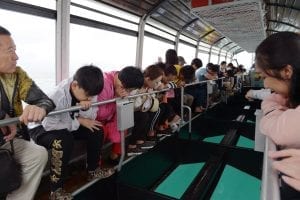Skift Take
India is becoming the boat that lifts Asia-Pacific destinations that have become too dependent on China outbound travel, which is sputtering. Australia is a good example of this.
 The risk of overly relying on China’s outbound travelers is surfacing again, this time in the land Down Under where Chinese arrivals have hit the wall, as our Australia contributor Martin Kelly writes in the report below.
The risk of overly relying on China’s outbound travelers is surfacing again, this time in the land Down Under where Chinese arrivals have hit the wall, as our Australia contributor Martin Kelly writes in the report below.
Like many destinations that have massaged growth from China to the point it becomes their main source of arrivals — for some, by far — it’s a reckoning that shouldn’t come as a surprise, yet it does.
Australia should have seen it coming. A 17 percent growth year-over-year in the last 10 years is unsustainable. Besides, it can no longer count itself the first Western destination for Chinese as, in that period, countries from Switzerland to South America have all been courting mainland arrivals with heavy marketing and easier visa processing. Besides, the world has shrunk, with more direct flights linking continents. From Shanghai, it takes over 10 hours to fly to Sydney and over 11 hours to fly to Zurich — not much difference. Australia moreover can no longer claim it has an edge on how to cater to Chinese travelers. On this, too, much of the world has caught up.
Ironically, it appears it’s Australia that has not caught up with much of the world in making it easier for Chinese to get visas. Indian travelers have also complained about Australia’s visa processing issues, as Skift reported recently.
Interestingly, another recurring theme is that India is becoming the buoy that helps keep China-reliant destinations afloat. Like Thailand, Australia is finding India to be a lifesaver. In the year ending March 2019, India posted the strongest growth of 15 percent to 343,000 visitors, spending a record $1.2 billion (A$1.7 billion), compared to the same period a year ago.
But as destinations readjust their targets and marketing budgets for India, it bears repeating that one must never get too attached to any one market.
— Raini Hamdi, Skift Asia Editor, [email protected], @RainiHamdi
Skift Stories and More Expert Insights
 Australia’s China Travel Slump: A Blip or Something Bigger? After years of phenomenal growth, Chinese inbound tourism has hit the wall in Australia. It’s a pivotal moment for an industry that has enjoyed a golden run over the past decade. The question now is what does the future hold for Australia’s international tourism industry? For now, the answer is far from clear.
Australia’s China Travel Slump: A Blip or Something Bigger? After years of phenomenal growth, Chinese inbound tourism has hit the wall in Australia. It’s a pivotal moment for an industry that has enjoyed a golden run over the past decade. The question now is what does the future hold for Australia’s international tourism industry? For now, the answer is far from clear.
What 5 Years of Klook Says About the Strength of Its Asia Playbook: Since Klook’s launch five years ago, big changes have occurred in the sector. TripAdvisor bought Viator, TUI-Musement, and Booking-FareHarbor, and most recently, Airbnb invested in Atlas Obscura. All this, plus competition from online travel agencies, will test Klook’s playbook, even though its strategies seem sound for now.
Social Media Requirement for Visa Waivers May Have Chilling Effect on U.S. Tourism: International arrivals to the U.S. are slowing down, so the industry is right to worry that requiring travelers to disclose social media profiles as part of the online application for the visa waiver program could be viewed as unwelcoming.
Australia Looks to Diversify Beyond Chinese Travelers Under Its New Tourism Boss: The head of Tourism Australia has the right training, for sure, as Australia seeks to increase foreign arrivals. She was overseeing its international offices and knows only too well that there is more competition for the global wallet.
The Rise and Fall of Iceland’s Tourism Miracle: Life has changed for Icelanders as the country’s tourism industry faces a slump. While many are looking at the change as an opportunity to reassess their business, the widespread decline of tourism across the country presents intractable problems.
Volocopter Raises $55 Million for Flying Taxis:Travel Startup Funding: Travel startups Volocopter, Atlas Obscura, KKDay, AmazingCo, Living Map, Sojourn, and Davinci Travel Systems announced more than $93 million in funding. The venture capital sector clearly isn’t spooked by talk of recession in some markets.
Asia Editor Raini Hamdi [[email protected]] curates the Skift Asia Weekly newsletter. Skift emails the newsletter every Wednesday.
The Daily Newsletter
Our daily coverage of the global travel industry. Written by editors and analysts from across Skift’s brands.
Have a confidential tip for Skift? Get in touch
Tags: australia, brand usa, china outbound, iceland, Klook, skift asia weekly, travel startups, visas
Photo credit: A traveler lounges in the private terrace of The Louise, Barossa Valley, Australia. Australia has become too dependent on Chinese inbound travelers, and now it's reckoning with a tourist slump. Luxury Lodges of Australia
